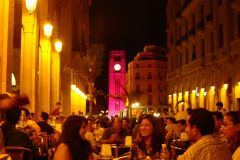 BEIRUT, Lebanon — Fewer restaurants than usual are open, making the narrow street appear dimmer. A staff shortage has owners tending bar, and the menus have thinned.Still, despite the death and destruction wrought by an Israeli offensive against Hezbollah militants, a small and tenacious coterie of war clientele have clung to Beirut’s famed nightlife, hoping for a moment of reprieve from the violence.
BEIRUT, Lebanon — Fewer restaurants than usual are open, making the narrow street appear dimmer. A staff shortage has owners tending bar, and the menus have thinned.Still, despite the death and destruction wrought by an Israeli offensive against Hezbollah militants, a small and tenacious coterie of war clientele have clung to Beirut’s famed nightlife, hoping for a moment of reprieve from the violence.
The fact that the restaurants and bars lining trendy Gouraud Street, a narrow one-way thoroughfare cutting through Beirut’s downtown, are still open and drawing clientele is a testimony to the resilience of a city and a country too painfully accustomed to war.Even at the height of the 1975-1990 civil war, Beirut residents braved militia fighting and Israeli bombing to head to the beach for a dip or to cafes and restaurants for an evening meal.While the conflict now is different, the expressions they wear on their faces are eerily reminiscent of those worn by Lebanese during the earlier war.
At one pub along the street, Sana Taweeleh sits next to her young son, Maxim Abi-Aad, at the long wooden bar dominating the tiny room. The outing was a treat for Abi-Aad, who was spending the weekend with his mother. Taweeleh and her husband are divorced."Do I look happy?" asked Abi-Aad from behind a giant glass of a frothy, pink fruit cocktail. "Well, at least this is better than being bored at home."
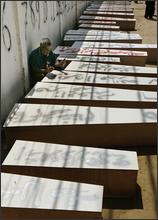 TYRE, Lebanon — Soldiers laid 72 coffins in two trenches, a mass grave for victims of the Israeli bombardment. Elsewhere, mounds of rubble sat undisturbed; rescue workers were too fearful of missiles to search for bodies.
TYRE, Lebanon — Soldiers laid 72 coffins in two trenches, a mass grave for victims of the Israeli bombardment. Elsewhere, mounds of rubble sat undisturbed; rescue workers were too fearful of missiles to search for bodies. Israel massed tanks and troops on the border Friday hours after calling up reserves and confirmed some units were already operating in Lebanon, as the army announced plans for a ground operation to destroy Hezbollah’s tunnels, hideouts and weapons stashes.
Israel massed tanks and troops on the border Friday hours after calling up reserves and confirmed some units were already operating in Lebanon, as the army announced plans for a ground operation to destroy Hezbollah’s tunnels, hideouts and weapons stashes.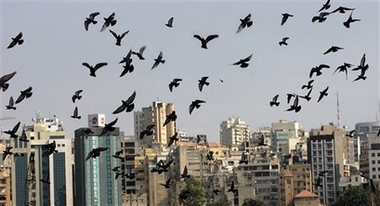 DAY 9, BEIRUT, Lebanon – Pitched battles raged between Israeli forces and Hezbollah fighters on the border Thursday, and Israel warned hundreds of thousands of people to flee southern Lebanon "immediately," preparing for a likely ground offensive to set up a buffer zone. U.N. chief Kofi Annan warned of a humanitarian crisis in Lebanon and called for an immediate cease-fire, even as he admitted "serious obstacles" stand in the way of even easing the violence. Annan denounced Israel for "excessive use of force" and Hezbollah for holding "an entire nation hostage" with its rocket attacks and snatching of two Israeli soldiers last week.
DAY 9, BEIRUT, Lebanon – Pitched battles raged between Israeli forces and Hezbollah fighters on the border Thursday, and Israel warned hundreds of thousands of people to flee southern Lebanon "immediately," preparing for a likely ground offensive to set up a buffer zone. U.N. chief Kofi Annan warned of a humanitarian crisis in Lebanon and called for an immediate cease-fire, even as he admitted "serious obstacles" stand in the way of even easing the violence. Annan denounced Israel for "excessive use of force" and Hezbollah for holding "an entire nation hostage" with its rocket attacks and snatching of two Israeli soldiers last week.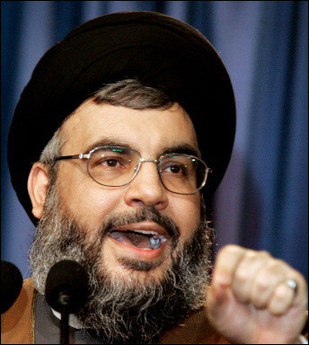 After more than a week of punishing Israeli aerial and artillery strikes, Hizb’allah chief Hassan Nasrallah says his group is easily absorbing all that Israel has thrown at it, and continues to successfully control the direction of the current fighting.
After more than a week of punishing Israeli aerial and artillery strikes, Hizb’allah chief Hassan Nasrallah says his group is easily absorbing all that Israel has thrown at it, and continues to successfully control the direction of the current fighting.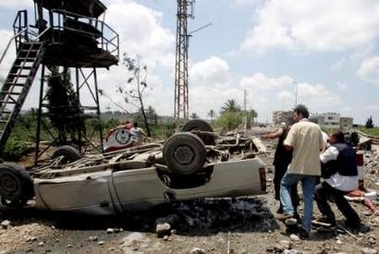 UT — At least 55 Lebanese civilians were killed as Israeli warplanes pounded the capital and countryside, making today the deadliest day in a week of attacks and pushing this country’s civilian death toll to more than 300. Fearful Westerners fled the country in droves.Violence also struck northern Israel, where two children were killed in a rocket attack in the town of Nazareth.
UT — At least 55 Lebanese civilians were killed as Israeli warplanes pounded the capital and countryside, making today the deadliest day in a week of attacks and pushing this country’s civilian death toll to more than 300. Fearful Westerners fled the country in droves.Violence also struck northern Israel, where two children were killed in a rocket attack in the town of Nazareth. 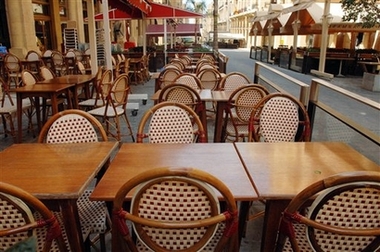 BEIRUT, 19 July (IRIN) – Lebanon’s dream of 2006 as a record year for economic growth has in the space of a week turned into a nightmare. Israeli air strikes have brought its fast-growing economy to an almost complete standstill. With thousands of nationals and foreign workers evacuating, and more than 500,000 internally displaced people, a bleak scenario confronts the country’s workforce. "The direct losses are estimated to be nearly half a billion US dollars," said Jihad Azoor, Lebanon’s Finance Minister. "But we have to read this number carefully because we have no way of assessing the situation fully to get an accurate estimate. And more losses occur by the hour."
BEIRUT, 19 July (IRIN) – Lebanon’s dream of 2006 as a record year for economic growth has in the space of a week turned into a nightmare. Israeli air strikes have brought its fast-growing economy to an almost complete standstill. With thousands of nationals and foreign workers evacuating, and more than 500,000 internally displaced people, a bleak scenario confronts the country’s workforce. "The direct losses are estimated to be nearly half a billion US dollars," said Jihad Azoor, Lebanon’s Finance Minister. "But we have to read this number carefully because we have no way of assessing the situation fully to get an accurate estimate. And more losses occur by the hour."  WASHINGTON (Reuters) – The Pentagon has ordered five military ships and thousands of Marines and sailors to help transport U.S. citizens out of Lebanon, a move that could sharply speed up the evacuation as fighting continues.
WASHINGTON (Reuters) – The Pentagon has ordered five military ships and thousands of Marines and sailors to help transport U.S. citizens out of Lebanon, a move that could sharply speed up the evacuation as fighting continues.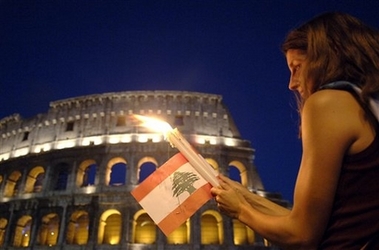 DAY 7, Time magazine, The ancient city of Tyre, sitting on a promontory built by Alexander the Great, is famed worldwide for its wealth of archeological treasures. Yet in the past week, Tyre, one-time home of the entrepreneurial Phoenician seafaring race, has become a casualty of the dark side of history, a place of fear, destruction and death caught up in the age-old hatreds of the Middle East.
DAY 7, Time magazine, The ancient city of Tyre, sitting on a promontory built by Alexander the Great, is famed worldwide for its wealth of archeological treasures. Yet in the past week, Tyre, one-time home of the entrepreneurial Phoenician seafaring race, has become a casualty of the dark side of history, a place of fear, destruction and death caught up in the age-old hatreds of the Middle East. 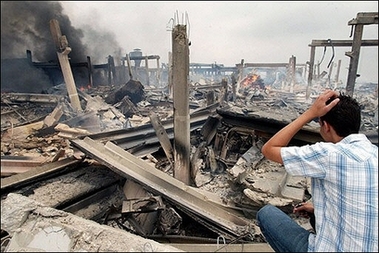 DUBAI, 18 July (IRIN) – Aid from the wealthy countries of the Gulf has poured into Lebanon, where intense Israeli attacks have smashed infrastructure and killed hundreds of civilians over the course of the last week.
DUBAI, 18 July (IRIN) – Aid from the wealthy countries of the Gulf has poured into Lebanon, where intense Israeli attacks have smashed infrastructure and killed hundreds of civilians over the course of the last week. 


